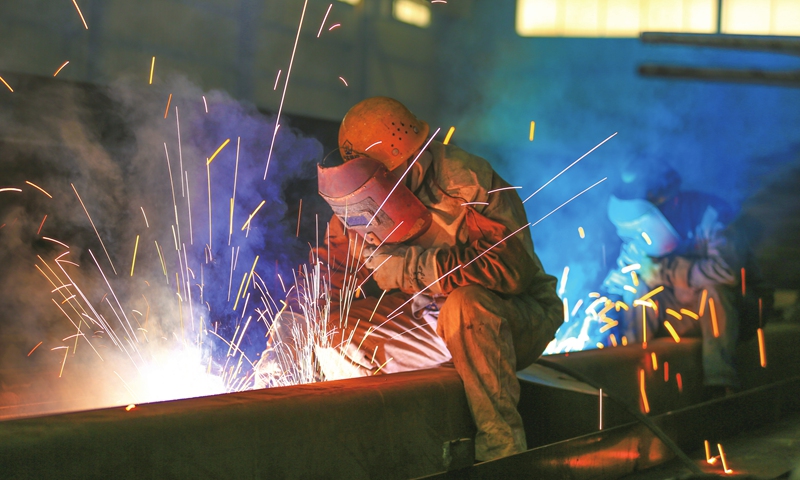
Employees of a metal materials company in Luoshe town, Huzhou, East China's Zhejiang Province weld a steel structure on January 20, 2022. As the Spring Festival approaches, companies in the town's industrial park are ramping up coronavirus containment while operating in full swing to ensure the completion of orders. Photo: cnsphoto
China's iron and steel association said on Monday that it will accelerate efforts to promote mergers and acquisitions (M&A) to increase the industry's concentration and profits amid challenges such as an increasingly complex international landscape, domestic COVID-19 resurgences and soaring raw material prices.
In the first three quarters of the year, China's steel output stood at 781 million tons, down 3.4 percent year-on-year. In July, daily average production was 2.63 million tons, the lowest in a year, according to data from the National Bureau of Statistics.
During the first nine months, steel exports totaled 51.21 million tons, down 3.4 percent on a yearly basis, while imports dropped 22.1 percent year-on-year to 8.34 million tons, official data showed.
In addition to the removal of export tax rebates, weak overseas demand contributed to the drop in exports, Qu Xiuli, deputy head of the China Iron and Steel Association (CISA), told the Global Times on Monday.
Qu said China's steel exports have been more stable than initially expected, with the forecasted exports to reach 66 million tons in 2022.
Due to fluctuations in major bulk commodities, the prices of raw materials including coking coal and iron ore remain at high levels, leading to elevated costs for steel companies, and the industry faces rising pressure to improve profits, according to the CISA.
Between January and September, CISA members
revenue stood at 4.87 trillion yuan ($670 billion), down 9.27 percent year-on-year. Combined profits slumped 71.34 percent to 92.8 billion yuan, according to the CISA.
Despite external and internal challenges, domestic steel demand is expected to increase along with the continuous recovery of the economy, thanks to the implementation of policies to stabilize the economy, it said, noting that ensuring market supply and demand and enhancing steel firms' profits are the priorities.
The association said that it will closely follow market trends to help steel companies reduce costs while increasing profits. It said that it will strengthen cooperation among steel firms and varied levels of government, try to establish a new mechanism of steel production capacity management that accommodates the new environment, and optimize the policy environment to greatly boost industry M&A.
The most challenging period has passed for the domestic steel industry, and it has embarked on a path to recovery, according to Wang Yingsheng, deputy secretary general of the CISA.
"Along with the government's push to ensure timely deliveries of stalled housing projects, downstream demand for steel has increased. The country's output of deformed steel bars has recovered to over 20 million tons for three consecutive months," he said, noting that the remarkable performances of the automobile and shipbuilding sectors are boosting the steel industry.




